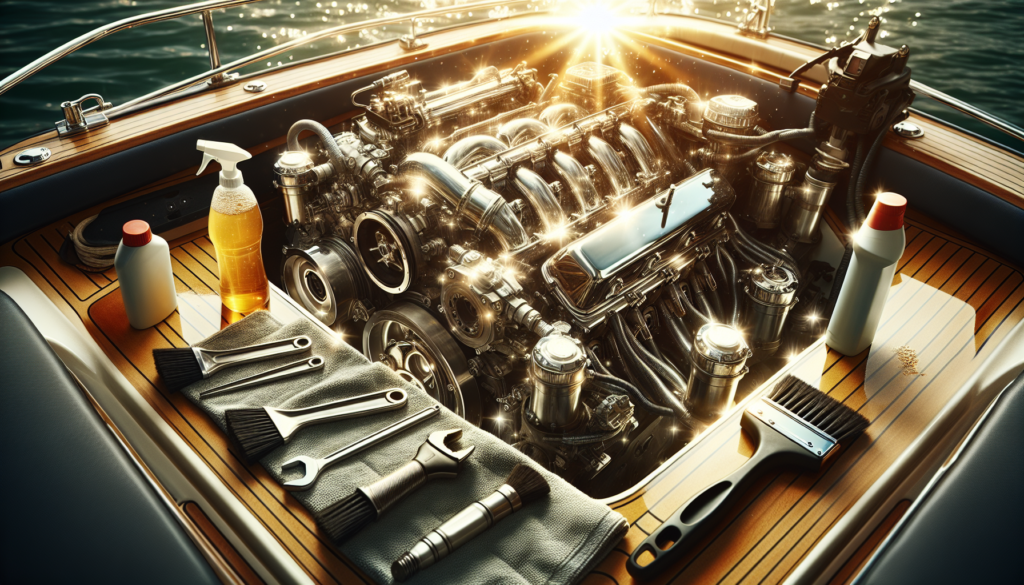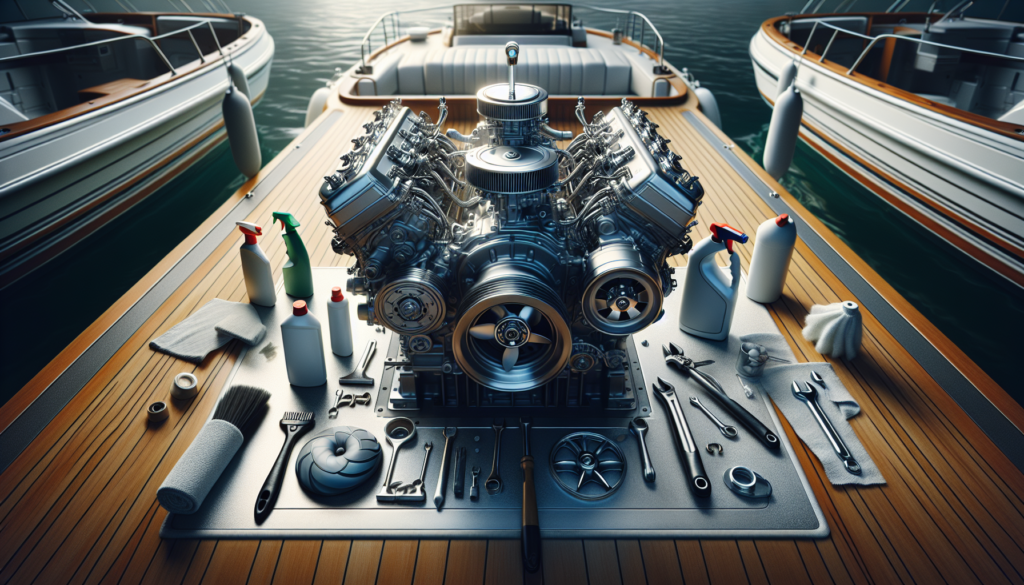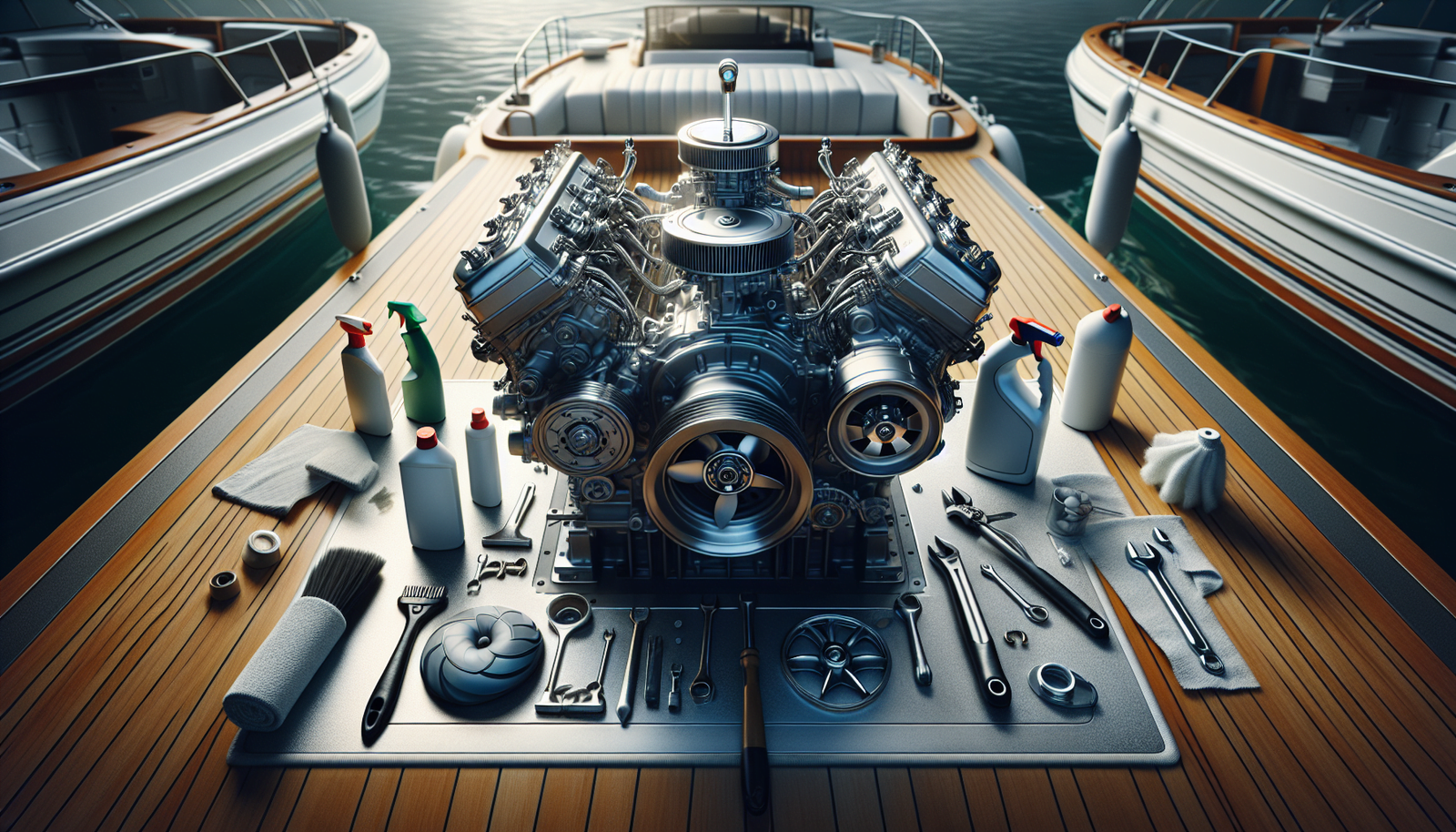Set sail with confidence by keeping your boat engine not just shipshape, but in pristine condition! In “Best Ways To Keep Your Boat Engine Clean And Well-Maintained,” you’ll explore essential steps and practical tips to maintain your boat’s engine. From regular servicing, choosing the right products, to executing thorough cleanups, and much more, this guide crafts a navigational chart towards a smoother and more reliable sailing experience.

Understanding The Importance of Boat Engine Maintenance
Just like any other machine or vehicle, boats also require regular maintenance to ensure their smooth and optimal functioning. One of the most vital aspects of boat maintenance is taking care of the engine, which powers the boat and is imperative for its smooth operation.
Why Regular Engine Maintenance Is Crucial
The boat engine, much like a car’s engine, is the heart of the boat. Regular engine maintenance ensures that the engine remains efficient and functional. Lack of regular maintenance can lead to loss of power, lower fuel efficiency, and in severe cases, complete engine failure.
Potential Risks of Neglecting Engine Maintenance
Neglecting regular engine maintenance can lead to several risks. There could be damage to internal parts that go unnoticed until it’s too late. Expensive repairs, breakdowns in the middle of the water, and decreased boat value are few potential risks.
Long Term Benefits of Regular Maintenance
In the long run, regular maintenance can prolong the life of your boat engine. It reduces the risk of unexpected breakdowns and minimises costly repairs. Regular maintenance also enhances fuel efficiency and optimises engine performance.
Monitoring Your Boat Engine Regularly
Regular monitoring of the boat engine is essential to ensure it stays in pristine condition.
Key Engine Parts to Check Regularly
Certain engine parts, such as spark plugs, oil filters, belts, and hoses, need regular checks. Also, it’s crucial to monitor the fuel system, keep an eye on the cooling system and examine the exhaust system.
Detecting Signs of Engine Problems Early
Anomalies like strange noises, excessive smoke, low power output, or decreased fuel efficiency are signs of potential engine problems. Early detection of these symptoms can help avoid costly repairs in the future.
Role of Regular Check-ups in Preventive Maintenance
Regular check-ups play a pivotal role in preventive maintenance. They can help detect minor issues before they snowball into significant problems. Consistent check-ups increase the lifespan of your engine and keep it running smoothly.
Performing Routine Cleaning of the Boat Engine
A clean engine is a happy engine! Routine cleaning is essential to get rid of dirt and debris that can harm your engine.
When and How Often to Clean Your Boat Engine
It is suggested to clean your boat engine at least once a year. However, if your boat operates in salty or dirty water, cleaning should be done more frequently.
Using the Right Cleaning Agents and Tools
Use marine-grade cleaning agents to avoid damage to your engine parts. Avoid household detergents that can be harsh on the engine. Also, an array of brushes and other cleaning tools might be required to reach those tricky spots.
Proper Techniques for Effective Cleaning
Ensure that the engine is cool before starting to clean. Use a brush for scrubbing off deposit, and rinse with fresh water. Don’t forget to dry your engine after cleaning to prevent corrosion.

Changing The Engine Oil Regularly
Changing the engine oil at prescribed intervals is fundamental for the smooth running of your engine.
Importance of Regular Oil Changes
Regular oil changes are needed to ensure proper lubrication of engine parts. This prevents part wear-off and aids in the smooth, frictionless movement of engine parts.
Choosing the Right Oil for Your Boat Engine
Choosing the right oil for your boat depends on factors like engine type, operating conditions, and manufacturer recommendation. Always ensure that you use marine grade oil for your boat.
Proper Steps to Change Your Boat Engine Oil
The basic steps to change the oil include warming up the engine, turning it off, draining the old oil, installing a new oil filter, and filling it up with new oil.
Maintaining Fuel System and Components
Your boat’s fuel system is another crucial area that needs attention.
Proper Maintenance of Fuel Tanks
Keeping your fuel tanks clean and free from water and microbial contamination is essential. It’s also important to monitor your fuel tank for rust or other forms of corrosion.
Keeping Fuel Lines Clean and Functional
Fuel lines should be inspected for cracks or signs of wear. Clogged or leaking fuel lines can be dangerous and should be replaced immediately.
Ensuring Proper Working of Fuel Filters
Fuel filters clear out impurities from your fuel. Regularly changing fuel filters helps protect the engine and contributes to its optimal performance.
Monitoring Propeller and Drive System
Your boat’s propeller and drive system are fundamental to its operation and should be monitored regularly.
Regular Inspection of the Propeller
Regular inspection of the propeller for dents, damages, or debris caught in it is essential. Even minor dents can affect your boat’s performance and fuel efficiency.
Understanding the Importance of Drive System Maintenance
The drive system transfers power from your boat’s engine to the propeller. A poorly maintained drive system can lead to decreased performance and potential damage to your engine.
When to Seek Professional Help for Propeller and Drive System Issues
In case of perceptible damage or issues, it’s wise to seek professional help. Complex repairs require specialised knowledge and tools.
Managing Boat Engine’s Cooling System
The cooling system prevents your boat engine from overheating and is essential for the engine’s longevity.
Significance of the Cooling System in a Boat Engine
The cooling system regulates engine temperatures and ensures that your engine doesn’t run hot, which could cause severe engine damage.
Routine Maintenance of the Cooling System
Regular checks, cleaning, and replacement of coolant are significant aspects of maintaining the cooling system. Topping up the coolant and regularly flushing the system are also necessary steps.
Troubleshooting Cooling System Problems
If your engine is running hot, or there is leakage in the cooling system, these are signs your cooling system needs attention. Immediate troubleshooting can prevent significant engine damage.
Keeping an Eye on the Exhaust System
The exhaust system vents gases from your engine and contributes to its efficiency.
Understanding the Functionality of the Exhaust System
The exhaust system removes waste gases from your engine and helps it breathe better. A well-maintained exhaust can significantly improve your boat’s performance.
Potential Issues in the Exhaust System and Their Impact
Issues in the exhaust system, like blockages or leaks can lead to decreased performance and potential engine damage. Regular inspection and cleaning can prevent such problems.
Regular Maintenance of the Exhaust System
Regular checks for any damage, routine cleaning, and ensuring the exhaust system is well ventilated are crucial for its maintenance.
Scheduling Regular Professional Maintenance Checks
While basic maintenance can be carried out by the owner, professional checks are also necessary.
When and Why to Schedule Professional Check-ups
Professional checks should be done at least once in a year or before the boating season begins. Professionals have the right tools, knowledge and experience to identify any underlying issues that might go unnoticed by the owner.
Choosing Reliable and Experienced Boat Mechanics
It’s critical to choose reliable, certified and experienced mechanics who are familiar with your boat model.
Working with Professionals for Long Term Boat Care
A trustworthy professional can provide excellent long-term care for your boat, ensuring its longevity and smooth operation.
Planning and Adherence to Regular Maintenance Schedule
Drawing up and adhering to a maintenance schedule is crucial for the health of your boat engine.
Drawing up a Maintenance Schedule
Plan a maintenance schedule based on manufacturer recommendations, your boat’s age, and the frequency of usage.
Adherence to the Schedule for Effective Maintenance
Sticking to the maintenance schedule ensures all aspects of the boat engine are regularly checked and taken care of, preventing sudden breakdowns or issues.
Adjusting the Schedule as Per Boat Usage Patterns and Model Specs
Your maintenance schedule can be fine-tuned based on your boat’s usage patterns and specific model specifications.
Maintaining your boat engine might seem like a daunting task, but regular checks and preventive maintenance can save time, money and safeguard against potential hazards. So, happy boating!


[…] your outboard motor in tip-top shape is crucial for your boat’s performance. Regular maintenance can prevent minor issues from becoming major problems, saving you a substantial amount of time and money in the long run. It […]